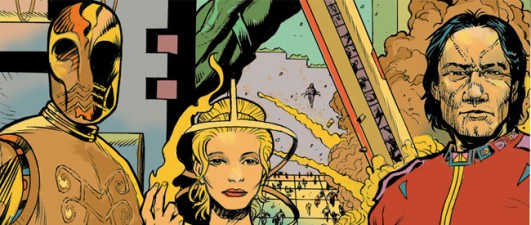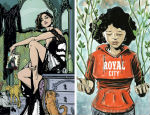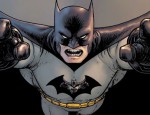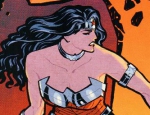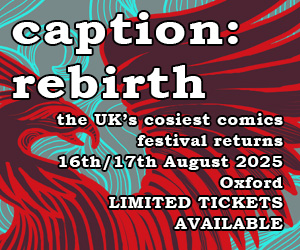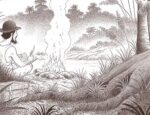Over 20 years in the making, sci-fi legend Harlan Ellison and Paul Chadwick’s cosmic Magnificent Seven bends reality even as it seeks to expand your consciousness.
There are few storytellers plying their trade today who can approach the thematic subtlety, laser-like focus, and sheer creative zeal of Harlan Ellison. The man is a force of nature. With his penchant for shocking his audience and critics with his acidic brand of social satire, disturbing yet insightful observations of the shadowy corners of the human condition we’d all rather ignore or forget, it’s no surprise his latest dalliance with the medium of comics challenges the reader’s perceptions of reality and heroism with such incisiveness and originality.
There are those – poets, artists, madmen, and sages – who transcend their chosen path, whatever it may be, to realize a greater purpose as universal shaman, the social custodians of our imaginative health. These are people of an inexplicable, unwavering clarity of vision, incapable of doing or being anything other than what they are. Ellison qualifies as one such being, sharing with the rest of us an undeniable voice that lulls even as it badgers, cajoles even as it bewitches. Like a boxer playing the angles, he comes at us from shocking, unexpected directions, often illuminating some forgotten corner of our psyches with an almost manic glee. A creative activist with an appreciation for the triumphs and tragedies of the past, Ellison nonetheless always has an eye cast towards the future.
In 7 Against Chaos, Ellison and comics icon Paul Chadwick (Concrete) introduce us to an exotic, dystopian future, where Reordered humans, pliable robots, and genetic misfits live as a slave class, catering to a decadent, top-heavy social hierarchy seemingly bent on its own collapse. Cosmic in scope yet driven by an innate tenderness of spirit, at its heart Ellison’s epic tale is a love letter to everything that’s great and honorable about humanity. Although his characteristic acerbic nature simmers beneath the surface, especially in the character of the mysterious Robed Man, Ellison tips his hat to comics luminaries Jack Kirby and Jim Starlin, infusing his story with a mythic weight. The third person narration, while it espouses metaphysical ruminations on the sorry state of human affairs, possesses a starkness of tone and lack of literary decoration that evokes the simple beauty and primal cadence of a Norse saga. Ellison, like scores of skalds before him, tempts and teases our imaginations to speak directly to our souls of old, universal truths.
Paul Chadwick’s art provides Ellison’s tale with a perfect vehicle for expression, his textured lines and classic design sense enhanced by the delightfully lurid coloring of Ken Steacy. The veteran art team takes a decidedly Kirby-esque approach, their pages exploding with bizarre, garish heroes and stunning layouts that draw the eye naturally from one huge, impossible scene to the next. Chadwick’s ability to inject even the most alien characters with emotion grounds Ellison’s cosmic cautionary tale in a very real, sometimes down-and-dirty humanity. Even characters such as Hoorn and Urr possess a distinct and vibrant spirit evident in every robust movement, their humanity clearly outshining the smooth, unbroken lines of their featureless faces.
Steeped in cosmic allegory and strange twists on familiar heroic archetypes, Ellison’s 7 Against Chaos transcends genre and medium, while paying tribute to comics’ ongoing exploration of the outer reaches of the imagination. One gets the sense that this is a story that could only be told in comics and yet there’s a certain purity of vision both in the art and script that undeniably stand on their own, even as they work in concert. At the end of the day, it’s this strange, powerful creative synergy between Ellison, Chadwick, and Steacy that launches the heroes of 7 Against Chaos straight into the shadowy nebulae of our imaginations.
Harlan Ellison (W), Paul Chadwick (A), Ken Steacy (C) • DC Comics, $24.99, July 10, 2013.





